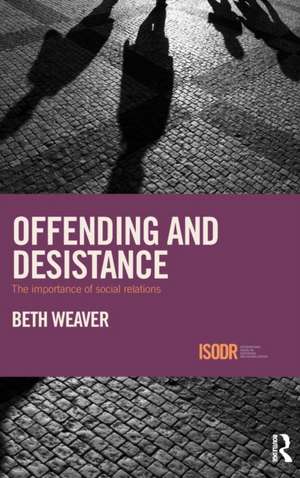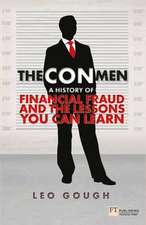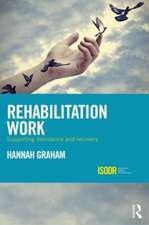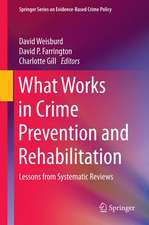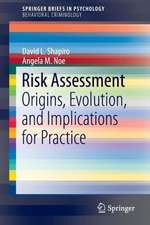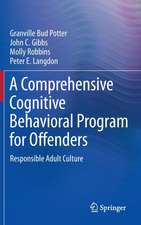Offending and Desistance: The importance of social relations: International Series on Desistance and Rehabilitation
Autor Beth Weaveren Limba Engleză Hardback – 21 iul 2015
In "Offending and Desistance," Beth Weaver examines the role of a co-offending peer group in shaping and influencing offending and desistance, focusing on three phases of their criminal careers: onset, persistence and desistance. While there is consensus across the body of desistance research that social relations have a role to play in variously constraining, enabling and sustaining desistance, no desistance studies have adequately analysed the dynamics or properties of social relations, or their relationship to individuals and social structures. This book aims to reset this balance.
By examining the social relations and life stories of six Scottish men (in their forties), Weaver reveals the central role of friendship groups, intimate relationships and families of formation, employment and religious communities. She shows how, for different individuals, these relations triggered reflexive evaluation of their priorities, behaviours and lifestyles, but with differing results.
Weaver s re-examination of the relationships between structure, agency, identity and reflexivity in the desistance process ultimately illuminates new directions for research, policy and practice. This book is essential reading for academics and students engaged in the study of criminology and criminal justice, delinquency, probation and criminal law. "
| Toate formatele și edițiile | Preț | Express |
|---|---|---|
| Paperback (1) | 341.85 lei 6-8 săpt. | |
| Taylor & Francis – 26 apr 2017 | 341.85 lei 6-8 săpt. | |
| Hardback (1) | 1114.08 lei 6-8 săpt. | |
| Taylor & Francis – 21 iul 2015 | 1114.08 lei 6-8 săpt. |
Din seria International Series on Desistance and Rehabilitation
- 9%
 Preț: 1005.12 lei
Preț: 1005.12 lei -
 Preț: 310.51 lei
Preț: 310.51 lei - 9%
 Preț: 1005.04 lei
Preț: 1005.04 lei -
 Preț: 434.83 lei
Preț: 434.83 lei -
 Preț: 406.97 lei
Preț: 406.97 lei -
 Preț: 385.25 lei
Preț: 385.25 lei - 9%
 Preț: 903.99 lei
Preț: 903.99 lei -
 Preț: 385.62 lei
Preț: 385.62 lei -
 Preț: 449.41 lei
Preț: 449.41 lei - 17%
 Preț: 257.76 lei
Preț: 257.76 lei -
 Preț: 416.22 lei
Preț: 416.22 lei -
 Preț: 392.50 lei
Preț: 392.50 lei -
 Preț: 484.69 lei
Preț: 484.69 lei -
 Preț: 389.38 lei
Preț: 389.38 lei -
 Preț: 411.64 lei
Preț: 411.64 lei -
 Preț: 233.25 lei
Preț: 233.25 lei - 5%
 Preț: 1160.70 lei
Preț: 1160.70 lei -
 Preț: 464.76 lei
Preț: 464.76 lei -
 Preț: 341.85 lei
Preț: 341.85 lei -
 Preț: 389.66 lei
Preț: 389.66 lei - 18%
 Preț: 1000.27 lei
Preț: 1000.27 lei - 18%
 Preț: 1000.87 lei
Preț: 1000.87 lei -
 Preț: 349.71 lei
Preț: 349.71 lei - 17%
 Preț: 258.70 lei
Preț: 258.70 lei - 5%
 Preț: 1047.45 lei
Preț: 1047.45 lei - 18%
 Preț: 1000.58 lei
Preț: 1000.58 lei - 18%
 Preț: 946.93 lei
Preț: 946.93 lei - 9%
 Preț: 934.94 lei
Preț: 934.94 lei - 18%
 Preț: 1064.01 lei
Preț: 1064.01 lei -
 Preț: 388.13 lei
Preț: 388.13 lei -
 Preț: 430.80 lei
Preț: 430.80 lei - 18%
 Preț: 1004.55 lei
Preț: 1004.55 lei
Preț: 1114.08 lei
Preț vechi: 1358.64 lei
-18% Nou
213.17€ • 223.17$ • 176.39£
Carte tipărită la comandă
Livrare economică 05-19 aprilie
Specificații
ISBN-10: 1138799726
Pagini: 298
Ilustrații: 15 black & white illustrations, 2 black & white tables, 15 black & white line drawings
Dimensiuni: 156 x 234 x 23 mm
Greutate: 0.59 kg
Ediția:1
Editura: Taylor & Francis
Colecția Routledge
Seria International Series on Desistance and Rehabilitation
Locul publicării:Oxford, United Kingdom
Public țintă
Postgraduate and UndergraduateCuprins
Notă biografică
Recenzii
‘This is an outstanding book. Through a blend of sophisticated theory and grounded analysis, Beth Weaver brings to life the complex journeys of six men as they attempt to extricate themselves (and each other) from multiple cycles of imprisonment and release. The in-depth and lucid accounts of how co-offenders might become co-desisters will surely stand as a unique and lasting contribution to the field of criminology and penology. Offending and Desistance offers, in short, an array of theoretical and practical challenges for anyone concerned with offender rehabilitation and reintegration.’ - Mark Halsey, Professor of Criminology, Centre for Crime Policy and Research, Flinders University, Australia
‘This book offers an innovative perspective on the process of desisting from crime, and is a must-read for scholars and practitioners interested in the underlying mechanisms associated with continuity and change in criminal behavior. Weaver focuses on members of a particular friendship group as they change their lives and relationships to one another, develop new concerns and social ties, and to varying degrees move away from earlier patterns of criminal involvement. Her analyses develop an elegant relational theory of desistance - one that moves beyond simple notions of network influence (i.e. the role of "bad companions," or "good wives") on one hand or atomistic views of the change process on the other.’ - Peggy C. Giordano, Distinguished Professor of Sociology, Department of Sociology, Bowling Green State University, USA
‘This important and intriguing book is (strangely) the first to engage seriously with giving up crime as a shared social process, rather than as an individual one. Although, like all brilliant intellectual advances, this may sound obvious, that's only because we all should have thought of it before. Beth Weaver does a remarkable job of advancing our understanding of desistance, both through painstaking empirical work and through genuinely innovative theoretical work. Everyone interested in rehabilitation and desistance must read and re-read this text - it is destined to become a classic.’ - Fergus McNeill, Professor of Criminology and Social Work, University of Glasgow, UK
'This book contributes to an emerging genre of relational criminological theorizing that reconfigures the value-laden classifications rooted in the great debates that plague the social sciences, including the structure vs. agency dialectic. Weaver’s innovative analysis of a rich collection of data makes this book one that should be highly recommended for students, criminologists, criminal justice professionals, and policy makers with an interest in the importance of social relationships in offending and desistance.' - April Bernard, Chicago State University, Criminal Law and Criminal Justice Books (Rutgers University)
"Offending and Desistance, Beth Weaver’s fascinating, exhaustively researched and dense contribution to the burgeoning desistance literature is an absorbing read."
David Orr, Scottish Justice Matters
"This compelling account of the pathways into and out of crime makes two key contributions to the existing literature in this area: firstly, Weaver analyses the dynamic influence of social relations on changes to an individual’s behaviour; secondly, the research involves a creative methodological approach that charts the heterogeneity and intersectionality of six men (in their forties at the time of the research) connected by their shared membership of a group called ‘the Del’. Hence, Weaver’s work is unique in examining the group dynamics involved in the co-production of offending and its subsequent desistance…. Weaver’s analysis demonstrates that, contrary to explanations that privilege either agentic or structural power, individual’s desistance emerges gradually following a reflexive consideration of individual and relational concerns, alongside which continued offending is either undesirable or incompatible. Her work also shows the dynamic nature of relationships, how a previously anti-social relation can become a pro-social pillar of support, and how various social relations can shape an individual’s identity. This book provides new empirical and theoretical insights into the process of desistance and the interplay between structure, agency, identity and reflexivity. Weaver’s work highlights the importance of relationships, both in the onset of offending behaviour and subsequent desistance from it, as well as the varied and dynamic nature of relationships. This is a must-read for anyone with an interest in desistance, and academics and practitioners alike will benefit from it." - Sam King, University of Leicester, European Journal of Probation
“The unique nature of this book’s methodology and the findings within, make it a useful addition to the desistance literature and is a must for those with an interest in this area. It is essential reading for criminology academics, criminal justice managers, students and those who want to understand more about desistance from crime and its multi-faceted nature. Those people who work in the probation service, resettlement services or in a face to face role with offenders would also find it useful, as the book helps to give another side to the offender journey; a side which is rarely looked at and so often misunderstood.” – Darren Woodward, University Centre Grimsby, Prison Service Journal (September 2016)
Descriere
In "Offending and Desistance," Beth Weaver examines the role of a co-offending peer group in shaping and influencing offending and desistance, focusing on three phases of their criminal careers: onset, persistence and desistance. While there is consensus across the body of desistance research that social relations have a role to play in variously constraining, enabling and sustaining desistance, no desistance studies have adequately analysed the dynamics or properties of social relations, or their relationship to individuals and social structures. This book aims to reset this balance.
By examining the social relations and life stories of six Scottish men (in their forties), Weaver reveals the central role of friendship groups, intimate relationships and families of formation, employment and religious communities. She shows how, for different individuals, these relations triggered reflexive evaluation of their priorities, behaviours and lifestyles, but with differing results.
Weaver s re-examination of the relationships between structure, agency, identity and reflexivity in the desistance process ultimately illuminates new directions for research, policy and practice. This book is essential reading for academics and students engaged in the study of criminology and criminal justice, delinquency, probation and criminal law. "
